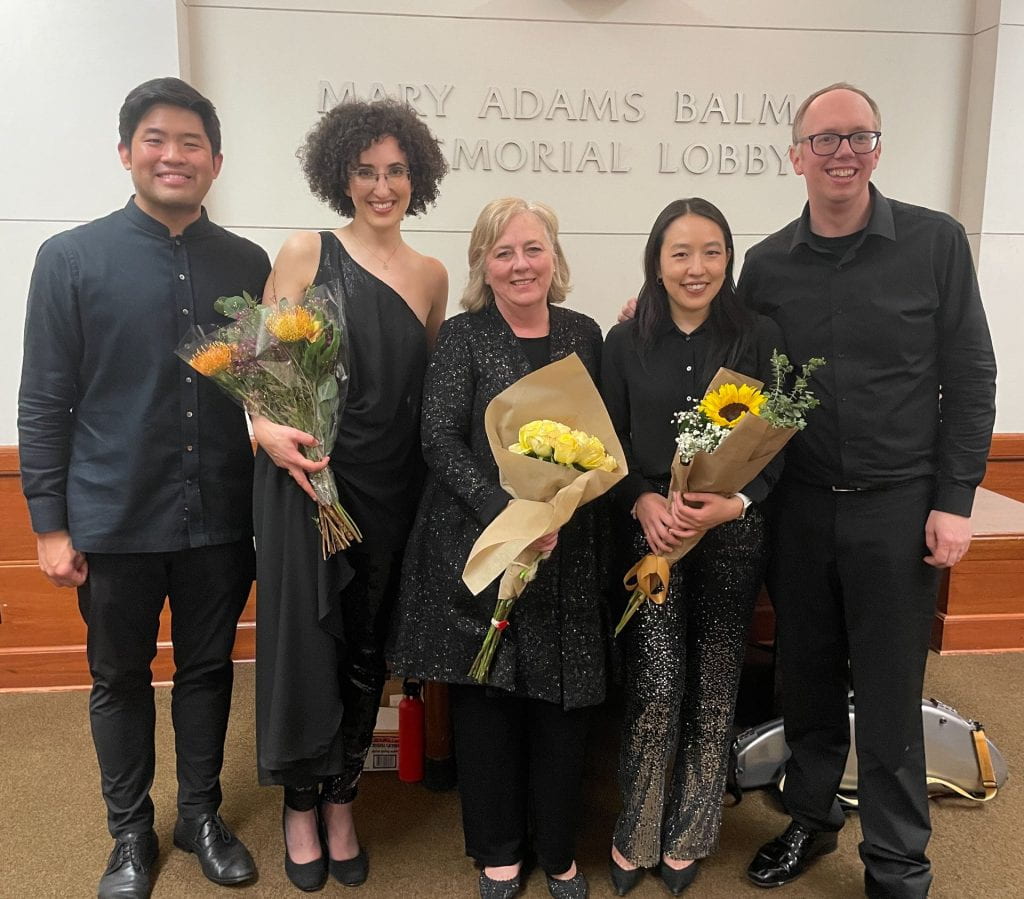A Review by Marek Zebrowski
The Verona Quartet (Jonathan Ong and Dorothy Ro, violins, Abigail Rojansky, viola, and Jonathan Dormand, cello) visited the USC campus for a master class on March 20 and a concert on March 23. Their sojourn at USC elicited great interest from string students and faculty, culminating in a packed auditorium for a breathtaking performance at the Polish Music Center’s annual Spring Concert in Newman Recital Hall.
Verona Quartet’s program presented works by two iconic twentieth century Polish composers, Karol Szymanowski (1882-1937) and Grażyna Bacewicz (1909-1969). The Saturday afternoon concert opened with a spirited rendition of Bacewicz’s Fourth String Quartet, a three-movement work completed in 1951 and awarded the First Prize at the prestigious competition in Liège, Belgium. The introductory Andante immediately conveyed the warmth and depth of the Quartet’s understanding of Bacewicz’s music; it continued with a lively and sympathetic reading of the Allegro molto movement proper. The lyricism of the second movement provided a wonderful contrast with the closing madcap Allegro giocoso movement, with Verona’s players exuding energy and gusto to great effect.
Szymanowski’s Second String Quartet, in turn, received a subtle and thoughtful reading with lovely shades of delicate coloring—be it in the shimmering opening of the first movement or the somber fugatos of the closing movement, where echoes of folk melodies from the Tatra Highlands were inflected just with the right dose of melancholy. In between, the Vivace scherzando middle movement, came off under Verona’s fingers as a well-balanced and neatly articulated intermezzo.
The closing selection on Verona’s program was Bacewicz’s First Piano Quintet, for which members of Verona Quartet were joined by Bernadene Blaha—USC Thornton Professor of Piano Practice, and guest artist for this concert. Written in 1952, the stylistic affinity between Bacewicz’s First Piano Quintet and her Fourth String Quartet is quite apparent, and the collaboration of the five musicians was exemplary from the first bars of the Quintet’s meditative and mysterious introduction. Throughout the performance, the ensemble work, phrasing and joint musicmaking by the five musicians on stage were clearly and satisfyingly evident. The whirlwind oberek, a folk dance much favored by Bacewicz, received a brilliant, highly strung, and thoroughly virtuosic rendition. The chorale-like chordal piano textures of the Grave movement were beautifully shaped and colored by Blaha, and ably complemented by the Verona strings. The energy of that performance culminated in the dramatic and dark Con passione section that concluded the entire work in a truly grandiose manner.
It was indeed an afternoon of intense and heartfelt musicmaking, and the audience certainly didn’t have enough of it. Enthusiastic applause led to several curtain calls for Verona and Ms. Blaha. For many in the crowd there was some regret that there wasn’t more music to follow. At the reception afterwards, the guest pianist and members of the Verona Quartet were besieged by their USC fans, clearly delighted with an inspiring musical experience they had just witnessed.
